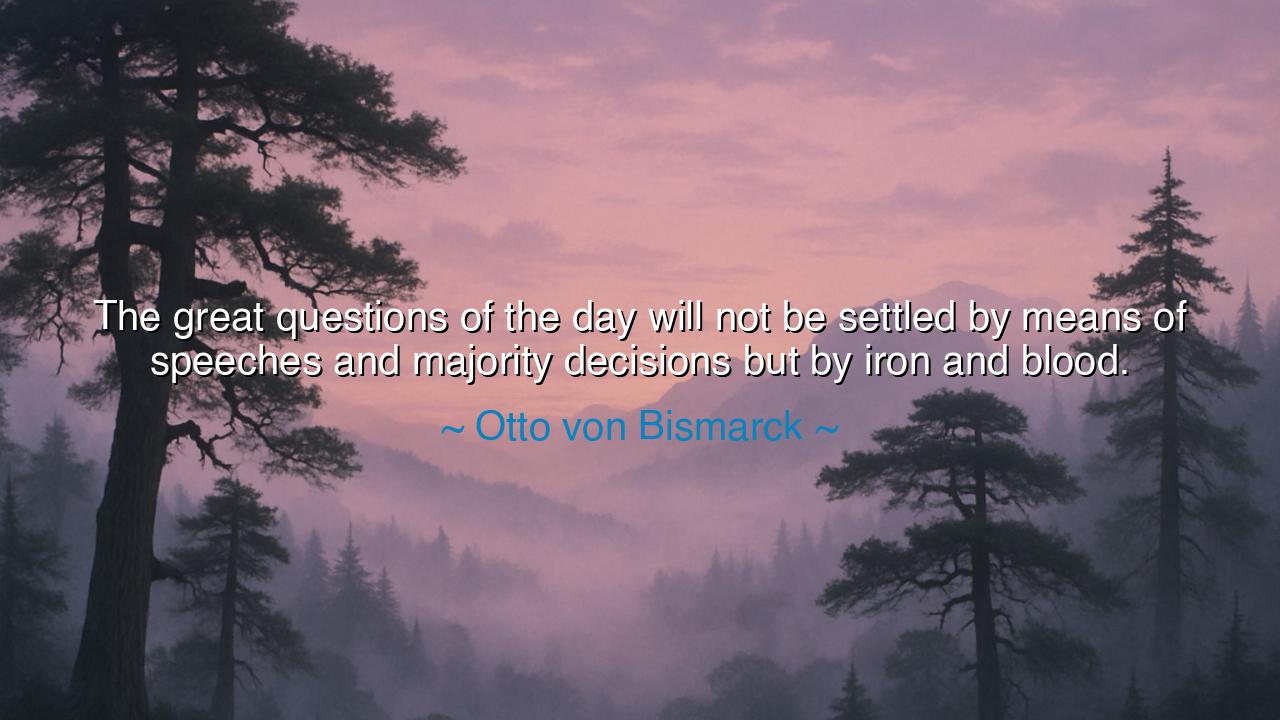
The great questions of the day will not be settled by means of
The great questions of the day will not be settled by means of speeches and majority decisions but by iron and blood.






The words “The great questions of the day will not be settled by means of speeches and majority decisions but by iron and blood” were spoken by Otto von Bismarck, the Iron Chancellor of Prussia — a man who forged nations from the chaos of history. These words, uttered in 1862, were not a call to mindless violence, but a proclamation of reality — a reminder that power, not persuasion, often decides the fate of empires. Bismarck understood the world not as men wished it to be, but as it was: a forge where ideals melted beneath the hammer of necessity, and where the will to act determined the destiny of nations.
In the spirit of the ancients, his words echo like a prophecy. For in every age, there come “great questions” — the defining struggles that shape the course of humanity. They are not answered by comfort, nor settled in the gentle halls of debate. They demand iron — the strength of resolve, the hardness of courage — and they demand blood, the sacrifice through which the weak are tested and the strong prevail. To the timid, these words may seem cruel; to the wise, they reveal a truth as old as time: that every lasting peace is born from conflict, and every freedom from the pain of struggle.
In the age of Bismarck, Europe was a patchwork of pride and power. The German states, divided for centuries, longed for unity, yet unity could not be spoken into existence. It had to be forged — through war, strategy, and the unbending will of men. And so Bismarck, like a blacksmith of destiny, gathered the fires of Prussian discipline and the steel of national ambition. He waged war not for conquest but for creation — and from the smoke and blood of the battlefield, Germany arose. His prophecy became flesh: the dreams of philosophers were realized not in debate, but in the march of armies.
Yet let us not misinterpret him. Bismarck was not glorifying war; he was revealing the nature of transformation. He knew that progress, whether in nations or in souls, requires struggle. Just as the sword must pass through flame before it gleams, so must humanity endure conflict before it finds clarity. To speak endlessly of ideals without the courage to act is to paint castles in the air. The ancients would say, “Words without deeds are the wind that scatters the seeds but never sows the field.” Thus, iron and blood are not merely weapons of war — they are symbols of action, sacrifice, and the price of true change.
Consider the tale of Sparta. The Spartans did not build their legacy through eloquence or rhetoric but through discipline and endurance. Their youth were raised in hardship so that their nation might stand unbroken. When Leonidas stood at Thermopylae, facing a sea of Persian soldiers, he did not speak of negotiation or votes — he stood as iron incarnate, and though he fell, his stand inspired a continent. Bismarck’s words might have been spoken in another tongue, but their essence would have been understood by every warrior of old: Strength shapes the world when words fail.
But the wisdom of this quote extends beyond the battlefield. It whispers to every man and woman who faces trials of their own. When life’s great questions — survival, honor, purpose — stand before you, they will not yield to mere words or dreams. They will yield only to action. The student who speaks of ambition but never works will fail; the leader who seeks harmony but fears conflict will crumble. There are times when one must act with iron will, endure the blood of sacrifice, and carve a path where none existed before.
The lesson, then, is clear: true change demands strength. Not all battles are fought with swords — some are waged in the soul, in the boardroom, in the home, in the struggle to rise from despair. Yet in every fight worth fighting, the spirit of Bismarck’s words endures: do not wait for permission, and do not expect the world to yield to reason alone. Forge your fate with effort. Temper your resolve with suffering. And when the time comes, let your actions speak louder than all the speeches of men.
So let it be remembered: “Iron and blood” are not merely tools of destruction, but the crucibles of destiny. The ancients would say that gods test mortals through fire — not to burn them, but to reveal their true strength. Be therefore unafraid of hardship. When the world demands proof of your will, do not offer words — offer deeds. For only through the iron of determination and the blood of endurance does one carve one’s name into the stone of time.






AAdministratorAdministrator
Welcome, honored guests. Please leave a comment, we will respond soon